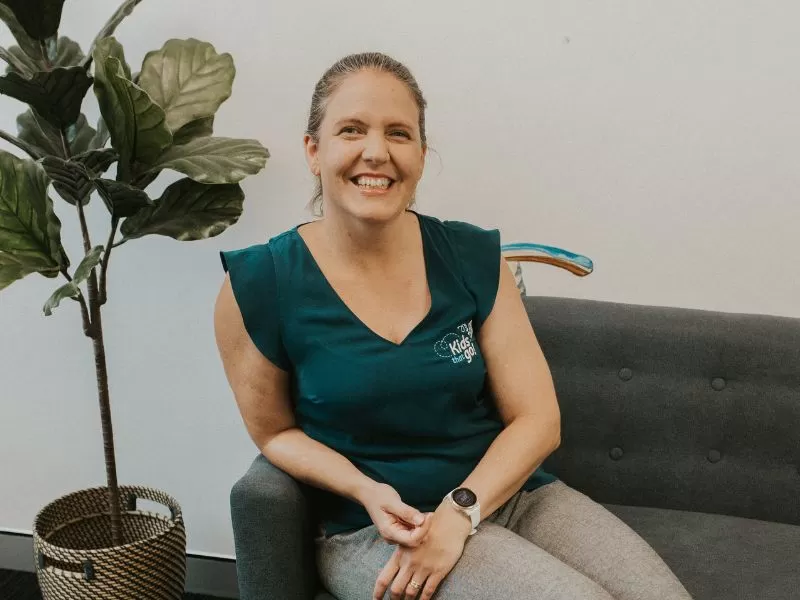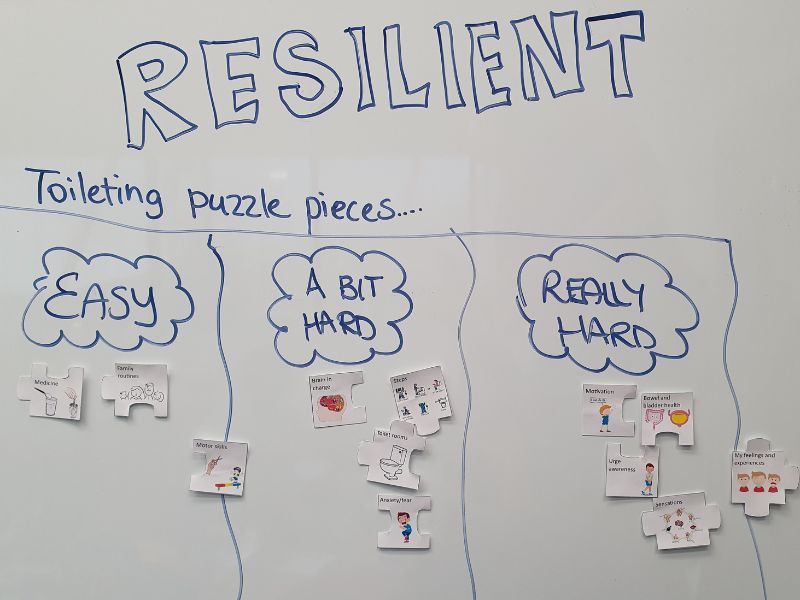, Bridge Magazine , Health Articles
Mrs Rebecca Khan has been working as an Occupational Therapist (OT) since 2001 having witnessed first-hand the significant need in the community for toileting skill development services. Mrs Khan was diagnosed with ulcerative colitis in 2003 and had a total proctocolectomy (a shortened gut) following surgical complications with post-op infections.

“That’s been a journey I’ve walked alongside my professional journey,” Mrs Khan said.
“It has really informed a whole lot of what I bring to my role with children who are incontinent and teaching them to listen to their body’s signals and build their toileting skills. My journey has helped me understand what they are going through and what might be helpful to them and their families.”
How can parents initially manage an incontinent child?
Mrs Khan says you firstly need to manage the medical side and ensure their child has had a thorough continence assessment with a relevant health professional to try to establish why the incontinence is happening.
Then there are the ongoing daily interventions that need to take place to help a child continue to poo and wee regularly so they’re not getting worse while the health professional is working with them to improve their toileting skills. This could include regular laxatives or medications and this can become a daily struggle for the family.
“Additionally, there are daily functional strategies and goals that you might be working on, such as practicing on the toilet, getting the child to sit and helping clean.”
Mrs Khan says if parents need support from an OT for their child to build toileting skills, they should book a long appointment with their GP and discuss their toileting concerns up front. Then, the GP can determine any medical tests or checks and referrals that need to take place before working on skill building with an OT.
“It’s simply because of that culturally and socially driven perception that it’s awkward or embarrassing that might make it hard for parents to ask for help. Shame often plays a role for parents too. But these are very important topics to bring up with your GP, and parents should feel comfortable to talk about these things to get good help for their child.”
WHAT ARE THE RISK FACTORS?
“It’s simply because of that culturally and socially driven perception that it’s awkward or embarrassing that might make it hard for parents to ask for help but these are very important topics to bring up with your doctor.”
skills they want to participate in each day. As kids grow, we help them learn activities like using the toilet, eating new foods, starting high school or getting a job. Often clients have never learned that target skill in the first place (common in childhood) or need to re-learn it after an injury (rehabilitation).
During a session with an OT like Mrs Khan, a typical session will involve talking about some of the health, behavioural and routine changes that can be made.
“In Occupational Therapy we focus on daily routines because continence is all about participating in taking care of one’s own body functions. So, if we can connect toileting to normal self-care tasks like mealtimes, dressing and teeth cleaning, it can really help embed toileting daily,” Mrs Khan said.
“We also build confidence by highlighting skills the child already has, to take care of their body such as washing in the shower. If the child feels embarrassed and ashamed thinking that they can’t toilet effectively, we can demonstrate that they are good at doing things for themselves, now let’s apply that same idea into the toilet space.”
To best prepare for these sessions, it is worth having a think about what you have and haven’t tried before, what you have learned, and how much time you have in the coming weeks to work on this.
Mrs Khan suggests it is important that everyone is not highly stressed at the time and that families/caregivers have taken some steps to slow down the routine a little, so that everyone has a little more headspace to think clearly. Holidays often work well.
“It’s important to be aware that sometimes change is slow. There are a lot of things that we’re changing in the child’s daily routine and they need to be made slowly.”
What should parents avoid when treating their child's incontinence?
“I say to parents whose children are taking a long time to learn, that our initial aim is independence and dignity. No matter how they use the toilet or a continence aid, if they empty and they hygienically change behind a closed toilet door, no one needs to know. They are functionally independent. Urge-directed toileting and removing continence aids can come later, if necessary, once the situation has calmed down.”
One of the most important considerations is to avoid talking about the child’s incontinence in a way that makes the child feel as though they are the problem.
“Toileting is such a personal, private topic and when it goes wrong, it can easily feel as though there’s something wrong with the child. They quickly pick up negative ideas that they are disgusting or gross, and that becomes very toxic for the child but also the child-caregiver relationship,” Mrs Khan said.
“It can help to externalise the problem: This is a health problem that we’re working on together. Let’s make a plan for today. This helps to untangle some of the child’s big emotions and avoidance and gets them to find solutions together.”
“Generally, kids don’t talk about their problems, they show their feelings through their behaviour. They don’t have well-developed coping strategies for their problems. When they are blocking, withholding and avoiding the topic, those are classic signs that the child needs help. Look at the problem as a health problem and decide on some practical action steps you can take together to work on it.”
While it can seem like a useful action, you should avoid googling symptoms. Aim for reputable sources such as those provided by your health professional or the Continence Foundation of Australia.
Neurodivergence and toilet training
There is a high crossover between neurodivergence and delays in toilet skill development, and bowel and bladder difficulties. Therefore, children with diagnoses such as Autism Spectrum Disorder (ASD), Attention Deficit Hyperactivity Disorder (ADHD), anxiety, depression and/or chromosomal abnormalities are likely to need additional support with toileting independence.
Mrs Khan reports that according to international studies, toileting difficulties should be screened for all disability groups: if your doctor or health professional hasn’t already initiated the continence conversation, it is important to do so.

Setting up your child for success
Setting up your child for success means that you believe that they can do it, if not now, then in the future. Mrs Khan says that almost all people can become continent or at least independent with most aspects of toileting. It also means being realistic about what we’re asking the child to do. If the child doesn’t have a reliable urge to go to the toilet, we can’t expect them to go to the toilet when they should. It’s just not fair. They will need reminders instead.
“Set their goals based on what they can realistically achieve otherwise from the beginning the expectations are too high and the child gets upset because they just feel as though it’s not possible. What you are really celebrating is child participation in caring for their own body,” Mrs Khan said.

